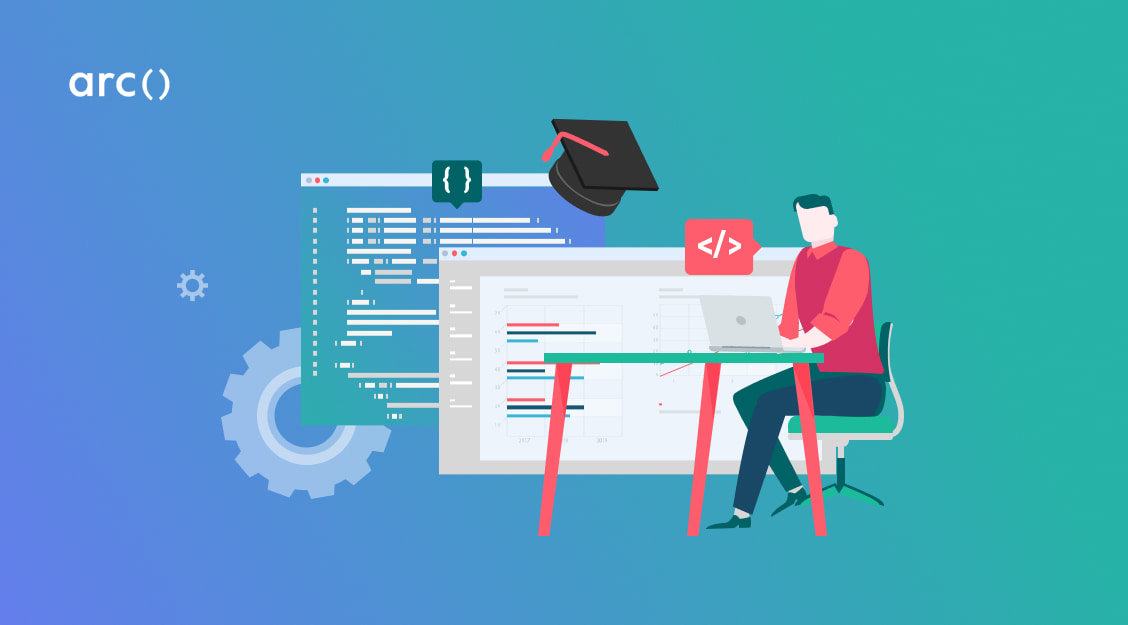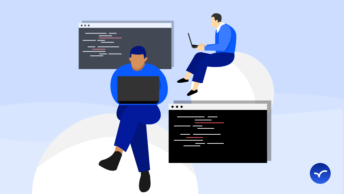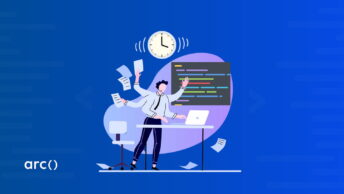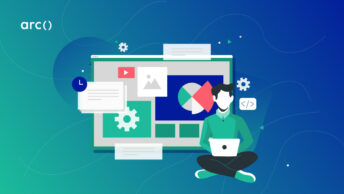Today, the vastly diverse field of computer science provides countless job opportunities for those with the right skill set and education. And the emphasis is definitely on “skill set” here. The job market is less rigid in terms of requiring traditional education and degrees than ever before.
However, are the pop culture examples of famous college dropouts that have gone on to reach stunning levels of success in software development the best role models for everyone?
While a software developer can find employment even without a degree — if they have the proper coding skills — the truth is somewhere in the middle. It’s worth examining all of your options, as well as the pros and cons of a software engineer degree, before making a decision.
Do I Need A Software Engineering Degree?
Let’s address the main question right off the bat — do you actually need a formal college degree to get a job in software engineering?
There are plenty of discussions on the topic and valid arguments for both sides of the debate — as you’ll see below.
The current “progressive” view is that traditional college degrees are sorely outdated. And yes, these days, practically anyone can find all kinds of online literature, courses, and instructional videos that help you learn to code. Plus, there are IT schools (both brick-and-mortar and online) and coding boot camps that provide shortcuts through academic education.
On the other hand, others are quick to point out that plenty of businesses still demand degrees before considering any candidate for various job roles. And “plenty of businesses” is an understatement here — a vast majority (around 75%) of professional developers have a bachelor’s degree or higher.
This doesn’t mean you can’t find a job without a software engineering degree — but there are definitely a few pros and cons to consider.
Read More: Why You Need a Software Engineering Portfolio to Land Interviews

Pros — Why You Need a Software Engineering Degree
The most obvious advantage of a software engineering degree is that you’ll be able to find your first job far more easily.
Without any formal education or training, you’re an amateur — and while many software development companies provide some graduate training for their employees, they will rarely have the ability to help someone learn absolutely everything on the job. This means you’ll have to do a lot of learning on your own, without a set pace or a specific structure to adhere to.
This is why many candidates without a CS degree don’t pass the initial HR pre-screen, even for junior positions. BSc candidates definitely have an advantage, as they already have documented proof of prior training in the field. (That said, you may be able to argue that you’ve already proven you can learn things without formal direction — but you’ll need to point to some concrete/proven examples of doing this!)
Besides having an easier time finding a job, candidates with degrees often simply have a wider breadth of theoretical knowledge — sometimes allowing them to make better decisions. Furthermore, many companies look at degrees as proof that candidates are able to learn new technologies fast — and as proof of foundational knowledge required for nuanced and complex projects.
Read More: Here’s How to Make a Resume for Full-Stack Developer Jobs
Cons — Why You Don’t Need a Software Engineering Degree
However, similar to WFH advantages, there are multiple potential benefits to pursuing a software development career without a formal degree.
For one, you’d be minimizing your educational expenses — even the most expensive standalone courses rarely reach the levels of student debt that people with degrees have to pay off. You can use this as a money-saving opportunity and save yourself from years of loan payments in the future.
Also, while a lack of formal educational structure is difficult for some people — for others, it’s liberating. While degree programs push you into part-time or full-time coursework for four years, alternative education options allow you to study at your own pace. To unlock your full potential, you can also look into educational software development services that cater to the unique needs of aspiring software engineers, ensuring a seamless path to achieving their degrees.
This is great because it lets you explore some industry practices and programming languages in greater depth, and because you can combine study more easily with a part-time, or even a full-time, job.
Plus, a degree-less path gives you more time to gather professional experience. While other software engineering students are taking their full-time courses, you can already start working in an IT role and go after industry certifications. Instead of a degree, this is a way to raise your professional credibility while applying for future jobs.
Read More: Common Interview Questions and How to Answer Them
How To Become A Software Engineer Without A Degree?
If you’ve decided to pursue this career without obtaining a degree, that’s great! The question now is — where to start?
Figure Out What to Learn
You should begin by reviewing and assessing your current level of knowledge about software engineering — for instance, the relevant high school courses you took or your own exploration of related subjects. If you already have some basic skills — even better! Just take the time to reach a firm conclusion on what you know already so that you can get an idea of what you need to learn next.
Once you reach a sufficient level of coding proficiency in any language, practice reading and analyzing code written by other software engineers. In this line of work, you will routinely need to decipher code strings to revamp existing code. What do you like about their work? What do you dislike? What can you learn from them? By analyzing others’ work, you’ll gain insights into your own.
Start Building a Software Portfolio
Next — and this is perhaps the most crucial part — make sure you have some small projects of your own under your belt. Use these as hard evidence of coding skills as you build a professional portfolio.
Potential employers that don’t have degrees as a hard requirement will still want to see some proof of your skills as a software engineer. Plus, smaller projects are the best way to refine and practice your coding skills.
Get Constructive Criticism
Don’t forget: it’s always a good idea to get some feedback on your work from established industry professionals. After all, software veterans know a lot!
If the person you’re asking for help is really busy, it may be useful to also specify the level or type of feedback you’re after. By making your request more specific, you reduce the burden on the other person.
If you don’t know any professional software engineers yourself, feel free to reach out to experts online after completing your projects and get some constructive criticism.
Read More: Avoid These Mistakes When Applying for Your First Job as a Dev
Other Software Engineering Education
As we have mentioned above, a lack of formal education does not mean a lack of education. There are other avenues to explore if you want to learn more about software development.
Certifications
Seeing as software engineers must possess coding skills in various programming languages, you should devote some time to earning certifications in relevant and in-demand programming languages.
By being certified as a beginner, intermediate, then finally, expert, you can increase your employability without getting a degree.
Hard & Soft Skills to Learn
There’s an abundance of technical skills that most developers need — for instance, understanding the basics of networking and databases is essential if you’re going to support and develop any application. Learning about testing is equally important, and so is mastering the relevant development environments, operating systems, data structures, and algorithms.
However, you shouldn’t disregard the soft skills necessary for succeeding in this line of work either. Today, learning to organize yourself and remain productive in a remote environment is practically a must. So are people skills, communication skills, and collaboration. And as someone who’s not pursuing a traditional degree, staying curious, open-minded, and adaptable is always necessary.
Read More: How to Get a Job as a Self-Taught Software Developer
Coding Boot Camp
If you want something faster than a bachelor’s degree, coding boot camps provide intensive training programs for people who are looking to break into software engineering.
They’re usually 12-week (or even less) full-time courses, and plenty of boot camp alumni find employment in their respective fields of study within a year upon graduating.
Internships & Work Experience
Finding an entry-level job in any tech-related role will definitely help you advance your current knowledge of general computer science.
Think laterally: as a tech store sales associate or a tech support specialist, you could gain some valuable work experience — enhancing your resume once you apply for the jobs you really want later on.
Online Education (Coursera & MOOCs)
Finally, there are plenty of coding courses for software engineers that you can complete — both in-person and online.
There are countless MOOCs (massive open online courses) that are free and available to anyone who wants to enroll. And websites like Coursera offer countless useful courses in various programming languages and related hard skills for software engineers.
Read More: How to Get Your Online Engineering Profile Noticed
Conclusion
There’s no getting around two facts — most currently employed software engineers have degrees, and people with degrees have an easier time landing a job.
However, there are also plenty of people who have succeeded in software engineering without a formal degree.
As long as you have enough curiosity, discipline, and a will to master the required skills to become a software engineer — you’ll still be able to find your dream job in the end!











Currently, various types of employed software engineers area well-educated means having degrees. An easier time landing a job. Getting a higher-paid job in engineering then you have enough curiosity, discipline, and a will to master the required skills to become a software engineer.